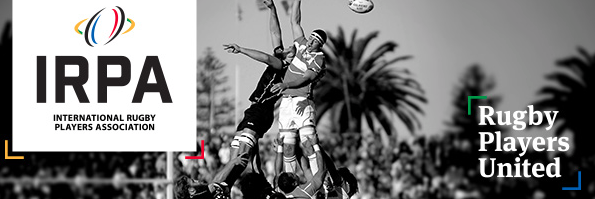|
The International Rugby Players’ Association (IRPA) hosted a Conference of its Northern Hemisphere members in London this week. The Conference was attended by representatives from member associations including the Rugby Players Association (England), IRUPA (Ireland), WRPA (Wales), GIRA (Italy) and EU Athletes UniSportPro, the World Athletes Association. The purpose of the assembly was to share best practise as well as focusing on the major international issues of importance to the game.
Chaired by IRPA’s Damian Hopley, the aim of the Conference was to review and further progress the focus areas of importance to the players and the game for the coming year. Amongst the core player welfare topics for discussion were concussion, season structure and player release.
The debate on concussion remains firmly in the spotlight and IRPA acknowledges the significant progress that has been made in this area with IRPA, World Rugby and other stakeholders driving forward initiatives to address this major area of importance to the welfare of players. IRPA recognises the work being undertaken in the key areas of concussion prevention, education and awareness, management and research and will continue to support World Rugby and other stakeholders in this area.
IRPA is supportive of the formal introduction of the concussion trials and initiatives developed over recent years, namely the HIA (Head Injury Assessment), Recognise and Remove and Return to Play protocols into World Rugby regulations. This will help to ensure the appropriate concussion management programmes are adopted across all competitions and player, and that key organisations and people are held accountable to best practice. As part of this, IRPA believes the time has come to implement a system of compulsory concussion education for players, coaches, team management and officials at all levels of the game on concussion management, and to also incorporate this requirement within World Rugby regulations.
Speaking at the Conference, IRPA Chairman Damian Hopley said:
“The past few seasons have seen an intense focus on concussion and the development and trial of processes to better assist elite players, coaches and team management on the diagnosis and management of suspected concussion and concussion. The Professional Rugby Injury Surveillance Report in England showed a significant increase in the number of concussions or suspected concussions reported, this is a result of the heightened awareness amongst the playing community due to the HIA trials, and improved methods pf concussion management. As well as having a competent system for the management of concussion within our game, we must also ensure we have a robust compulsory education requirement so that our members and stakeholders understand not just the process in place but the signs, symptoms and return to play protocols”.
Speaking on the need for concussion education, IRPA Player Advisory Board Member, Jonathon Sexton said:
“As players we have seen the positive results from the concussion trials first hand both in terms of player welfare and safeguarding the game. From a player perspective, we have entrusted IRPA to work with World Rugby and others to ensure that our game protects its players and I believe great progress has been achieved. The management of concussion is constantly evolving and improving, players are far more aware of concussion as a serious issue. Player safety is paramount and education plays a vital part in that; players, coaches and all those associated with the game must ensure they are properly educated on the signs, symptoms and effects of concussion”.
Given that it is a Rugby World Cup year, delegates also discussed the increasing pressure and demand on elite players in relation to the structure of the global season. Accounts of the experience of individual players highlighted the need to better manage game and training load with injury prevalence an increasing concern voiced amongst those in attendance.
From an IRPA perspective, a review of the existing competition schedules and season structure needs to be undertaken to ensure that players can rest, recover and prepare appropriately during a meaningful competition off season. Recognising the importance of the international game and the players’ right to participate in it and the need for thriving domestic competitions means that this is one of the biggest challenges facing elite level players and the wider game.
IRPA members support a mandatory competition off season period of 12-14 weeks for all players and the introduction of a clear distinction between club and country assembly periods during international windows.
Commenting on season structure, England’s Alex Corbisiero:
”From a players perspective I think it’s essential to agree a mandatory rest period during the off-season to allow our bodies to recover from what is an increasingly physical sport. We all love the game of rugby and want to play as much as possible, but player welfare is of paramount importance and the introduction of a clearly defined season and off season structure must be a positive step for all involved”.
IRPA will convene an equivalent Southern Hemisphere Conference in May of this year to continue the progress already made on these areas of concern as well as addressing other identified areas of importance to the game. |
|
 MENU
MENU
